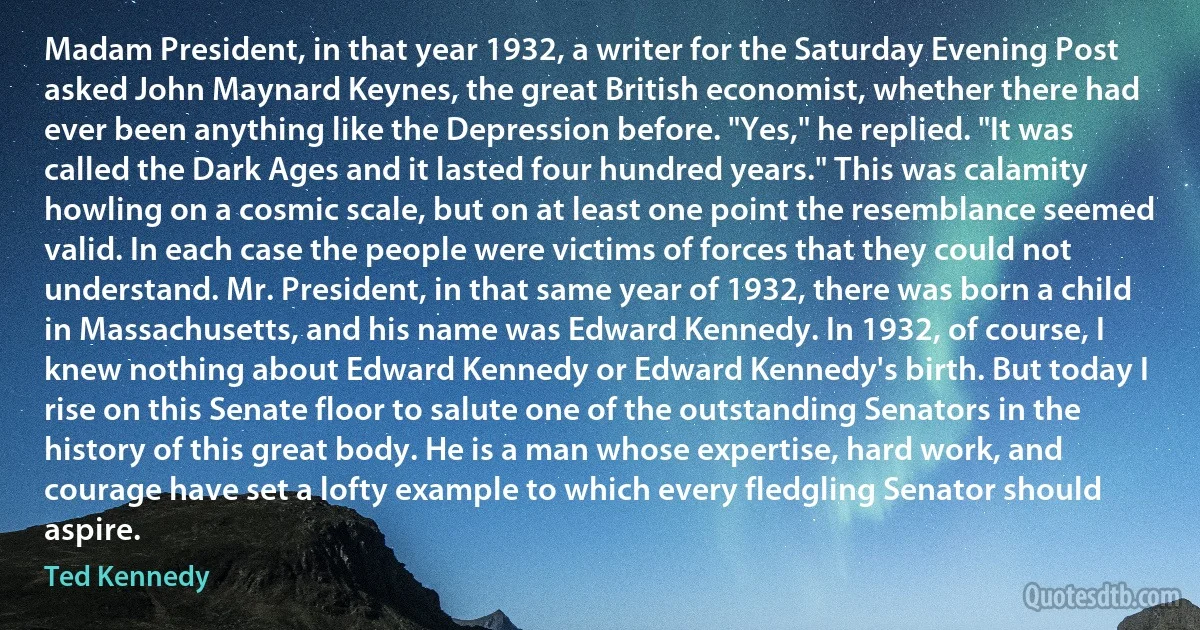Keynes Quotes - page 4
We have been living in an ideological bubble - one of market fundamentalism.From the trauma of the Great Depression to 1973, there was a broad consensus across the democratic world that markets were absolutely essential to generate wealth, but they will also cause all sorts of problems if they are left unregulated. Economists like JM Keynes and JK Galbraith taught us that if you abolish markets, you get starvation; but if you abolish all the democratic checks and balances on markets, you get a system that eats itself. Unregulated businesses will cause unsustainable levels of pollution and inequality, and ultimately start pursuing unhinged business models that cause the whole system to collapse.

Johann Hari
After careful research along these lines, I came to the annoying conclusion that Keynes had been 100 percent right in the 1930s. Previously, I had thought the opposite. But facts were facts and there was no denying my conclusion. It didn't affect the argument in my book, which was only about the rise and fall of ideas. The fact that Keynesian ideas were correct as well as popular simply made my thesis stronger.

Bruce Bartlett
It was in 1926 that John Maynard Keynes wrote his now famous essay "The End of Laissez-Faire." Since then, history has evolved through the Great Depression, "hot" and cold wars, the establishment of the Bretton woods regime, suspension of convertibility of the US dollar into gold, oil shocks, and the information and telecommunications revolution. The situation at the end of the 20th century seems to be quite similar to that of the late 1920s, having come full circle.

Eisuke Sakakibara
My life has been dominated by my differences with John Maynard Keynes. That turns almost wholly on the - I believe, false - conviction that there is a simple relationship between aggregate demand for consumer goods and the volume of employment. Keynes was one of the most intelligent people I knew but he understood very little economics. He must not be blamed for his disciples. He knew the danger of inflation.

Friedrich Hayek
As the title of his 1941 book indicates, the theory of capital lay at the heart of his theory of the cycle. The reason is that he attributes the cycle not to changes in aggregate demand, or even to changes in the quantity of capital, but to changes in the structure of production and hence the structure of the capital stock. In this, his theory was highly unusual: one of the reasons for his failure to engage more effectively with Keynes was the latter's inability to see how the theory of capital could be of any importance for the cycle. Because the theory of capital is so central, and because it is so complex, it needs to be explained carefully. After that, the rest of his theory falls into place comparatively easily.

Friedrich Hayek
So far as the Labour party is concerned, The Open Society is almost entirely irrelevant. The Labour party from the Webbs to Attlee, though it believed in state-power as the antidote to inequality and competition and misunderstood Stalin's Russia, was neither intellectually Stalinist nor intellectually totalitarian. Its defects were then and are now more domestic and homely – the minority-mindedness and nonconformist conscience which Keynes discerned in Kingsley Martin, the editor of the New Statesman, the conviction of moral impregnability which makes it intolerant, evasive and querulous when policy conflicts with principle or goodwill stubs its toe on interests, and the sympathy for fads and crankcauses which it inherited from the Liberal party and continues to display in the imprisonment of General Pinochet, the campaign against fox hunting and the nonsense involved in Mr Cook's "ethical foreign policy".

Maurice Cowling


